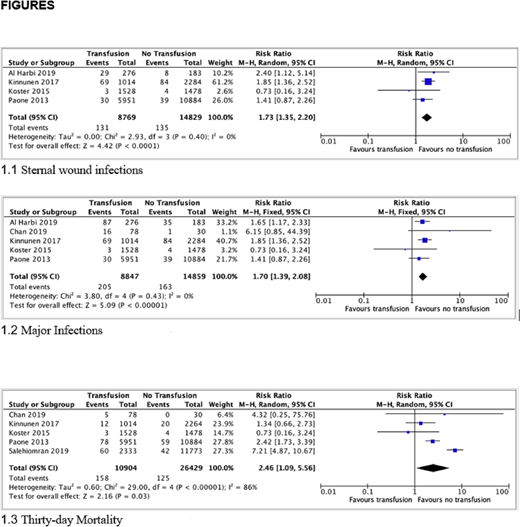BACKGROUND
Blood transfusion in patients undergoing coronary artery bypass surgery (CABG) remains high despite advances in perioperative blood conservation. Several studies have shown poorer clinical outcomes in isolated CABG patients who receive blood products, including an increased rate of renal failure, non-fatal myocardial infarction, and death. Our study sought to determine the impact of blood transfusion on sternal wound infections and other major infections in patients who undergo isolated CABG.
METHODS
We performed a systematic search using PubMed, Google Scholar, EMBASE, SCOPUS, and ClinicalTrials.gov without language restriction until May 15, 2020. A random-effects model was utilized to calculate risk ratio (RR) and mean difference (MD) with 95% confidence interval (CI).
RESULTS
In patients undergoing isolated CABG, sternal wound infections [RR 1.73 (95% CI: 1.35 to 2.20; p<0.0001)] and overall major infections [RR 1.70 (95% CI: 1.39 to 2.08; p<0.0001)] were significantly higher in those who received a periprocedural blood transfusion. Thirty-day mortality was lower in patients who did not receive any transfusion [RR 2.46 (95% CI: 1.09-5.56;p=0.03)]. The test of heterogeneity was low for clinical outcomes aside from 30-day mortality.
CONCLUSION
Periprocedural blood transfusion is associated with an increased risk of sternal wound infections and major infections and higher 30-day mortality in patients who undergo isolated CABG
No relevant conflicts of interest to declare.
Author notes
Asterisk with author names denotes non-ASH members.


This feature is available to Subscribers Only
Sign In or Create an Account Close Modal